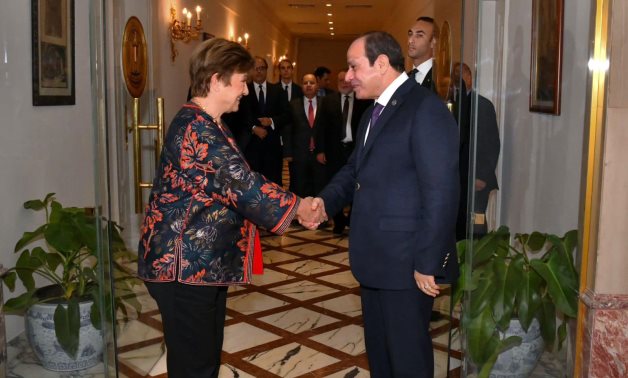President Abdel Fattah Al-Sisi met with Kristalina Georgieva, Managing Director of the International Monetary Fund (IMF), and her delegation in Cairo on Sunday, 2 November.
The visit comes before the IMF’s fourth review of Egypt’s loan program, potentially unlocking an additional USD 1.2 billion (EGP 58.7 billion) in financing, essential for sustaining Egypt’s reform initiatives.
At the heart of the discussions was Egypt’s pressing need to reduce inflation, which reached 37 percent last year, while ensuring the country’s most vulnerable populations remain supported amid ongoing subsidy cuts.
Prime Minister Mostafa Madbouly emphasized Egypt’s dedication to a flexible exchange rate system, a central tenet of the IMF’s reform recommendations, which the government views as crucial for building long-term economic resilience.
Georgieva acknowledged Egypt’s progress in macroeconomic indicators, noting the positive assessment of international rating agencies and recent upgrades in Egypt’s credit rating.
She also commended Egypt’s efforts to empower the private sector, vital for addressing the nation’s significant employment needs, as well as its commitment to sustainable growth despite obstacles that have impacted foreign currency reserves and public revenues.
Georgieva expressed the IMF’s continued support for Egypt’s objectives and urged adaptability as global economic conditions rapidly evolve.
President Al-Sisi affirmed that the national efforts will focus on easing the financial burden on citizens while attracting investment to stimulate growth.
According to IMF projections, Egypt’s economic growth rate is expected to rise to 4.2 percent in the 2024-2025 fiscal year, up from 2.4 percent last year, largely driven by initiatives to boost private-sector investment. Inflation is also projected to ease, likely settling at around 25-26 percent this fiscal year, which could provide significant relief for low- and middle-income families struggling with high prices.
The IMF’s USD 8 billion (EGP 391.2 billion) program with Egypt, initially approved in 2022 and later expanded, is designed to foster economic stability, curb inflation, and catalyze job creation. A core component of this collaboration has been the structural reform agenda, which includes transitioning toward a green economy and ensuring sustainable development.







Comments (0)